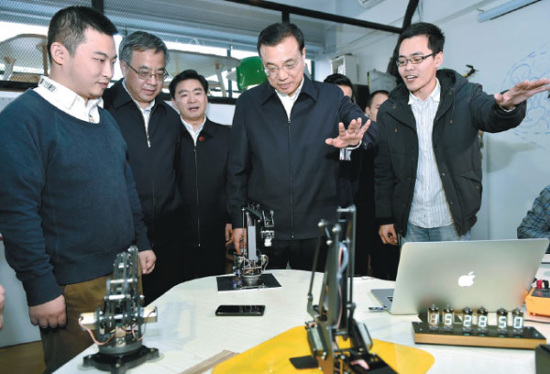
Premier Li Keqiang tried a remote control mechanical arm in Chaihuo Makerspace, an innovation platform in Shenzhen, Guangdong province on Jan 4, 2015. (Photo/China News Service)
Yin Sang, 22, has founded three companies while his childhood buddies are still sending out resumes.
Like thousands of young people inspired by Microsoft founder Bill Gates' empire, Yin believed in the idea of changing the world for the better by using technology.
The Chinese version of Forbes published its 30 under 30 listing of entrepreneurs early last year. Five are born after 1990, Yin is the youngest.
He founded an online karaoke/social networking platform called 17chang, or "sing together". The platform aims to change the traditional karaoke industry by introducing Internet-based social networking features. Customers can share their own voices by partnering with bricks-and-mortar karaoke bars, they can even invite other users to sing with them offline.
Yin is just the one of millions of young people to have started their own firms at a very young age.
According to a report issued by the National Entrepreneurship Research Center of Tsinghua University's School of Economics and Management in Beijing, the "early-stage startup index" of China, the country placed 22nd among 70 countries, meaning it is regarded as "active" in entrepreneurship
People born in the 90s are experiencing China's best time. This generation passed their childhood and adolescence as the country entered a steady, settled period with the economy taking major strides.
Their 60s-born parents slaved to ensure their children enjoyed the best possible life and education of any generation.
Yin was long interested in entrepreneurship and his parents supported him to go to the US and study. Only two universities at the time offered a course in entrepreneurship.
The 90s-born generation hasn't experienced famine, poverty, wars or material deprivation. They never feel insecure about material matters as do middle aged people.
That might just be the difference between the post-90s entrepreneurs and those born in the 80s or even earlier.
Yin believes people born in the 70s or 80s focus on practicability such as Alibaba's Taobao or booking website Ctrip, designed to offer a better deal or products. While young generations favor aesthetic things, entertaining and social networking.
Growing up in the Internet era, introduced to China in 1994, the post-90s generation is fortunate to acquire information and is open to all possibilities.
They are used to multitasking at a faster speed than their parents. The 1992-born entrepreneur Wu Xingyu created a metaphor: "It's like the network's bandwidth. Our (people born in the 90s) bandwidth is 100M/s, theirs (people born in the 80s and 70s) is 10M/s."
















































